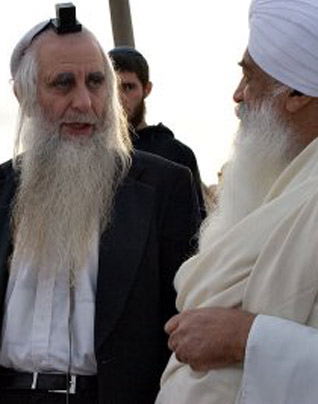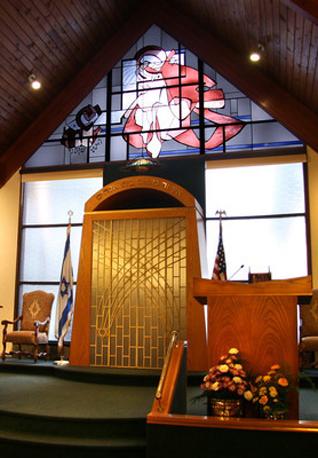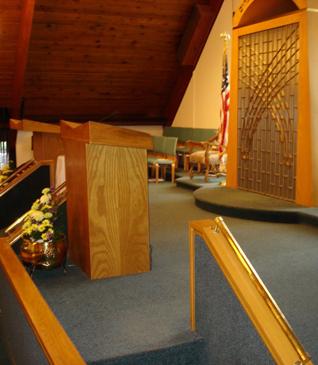Roundtable
The Gift of Tzedakah: Jews & Sikhs Share Place of Worship:
The Roundtable Open Forum # 77
by JOE DOWD
In Hebrew, the word is “tzedakah.”
It refers to acts of charity and philanthropy, an important part of Jewish spiritual life. The members of the Temple Beth Elohim’s tzedakah is a gift to the community, a way for the followers of another faith to practice their beliefs.
In a gift coincidentally timed to Rosh Hashanah, the Jewish New Year, Temple Beth Elohim has offered its social hall for use by the members of the Guru Gobind Singh Sikh Center, which has been shuttered for months by a slew of code violations.
The Sikhs have accepted the invitation, and recently began worship services at the Old Bethpage synagogue last week. They will conduct their services on Sundays through November, and beyond if necessary.
"We saw it as a real chance for peace and understanding,” said Rabbi Michael Churgel, the spiritual leader of Temple Beth Elohim. “We’re thrilled because it’s an opportunity for our communities to share and learn from each other.”
The Gurdwara on Old Country Road in Plainview has been shut down for months by a variety of code violations brought by Town of Oyster Bay officials. The town was acting on the complaints of nearby residents. The gurdwara draws hundreds of people to its services from all over Long Island (N ew York, U.S.A.). Some of their festivals go well into the night and involve music on traditional instruments.
The Sikhs, who have a long tradition of feeding vegetarian specialties to visitors and taking in travelers, ironically found themselves homeless.
Surinder Singh “Charlie” Chawla, chairman of the Guru Gobind Singh Sikh Center, approached Rabbi Churgel with his dilemma at a recent Plainview interfaith clergy meeting. The next evening, Churgel went to the temple’s Board of Trustees meeting, which unanimously agreed to offer the Sikh community the use of the synagogue's social hall.
"It is very gracious of them," Surinder Singh said Tuesday. "They have welcomed us with open arms. This is a chance for our two communities to grow together."
The Sikhs will conduct services most Sunday afternoons from now through November and, “possibly beyond that time” while the Sikhs attempt to resolve their legal issues, Churgel said. Their case is in a Nassau County court. The town said the gurdwara was operating without a certificate of occupancy and had no public assembly permit, among other issues.
Surinder Singh said his group is working with the town to resolve the issues.
In part, the synagogue wants to seek friendship and knowledge between the two religious communities, Churgel said. In addition to the regular Sunday services, Temple Beth Elohim will host "Diwali," the Sikh Festival of Lights, on the night of Wednesday Oct. 26 and a second Sikh holy day on Thursday Nov. 10.
In a letter dated Sept. 27 to the congregation, Churgel and Temple President Daniel Naftol explained their reasoning for the offer:
“We view this as not only as an act of tzedakah, but we see this also as a wonderful opportunity to form a close relationship with our Sikh neighbors and to learn from one another,” the letter said.
The Sikh congregation is active in the Plainview community and has performed outreach programs at the library and elsewhere. Often misunderstood by Westerners, Sikhs are followers of the teachings of the 10 revealed Gurus. The 10th, Guru Gobind Singh established the Khalsa, the body of baptized Sikhs. The faith has 30 million followers worldwide, the vast majority in Punjab. Their holy scripture is entitled the Gurū Granth Sāhib Ji, a compilation of the writings of the Gurus and saints and mystics of other faiths.
Maimonides, the 12th Century Jewish philosopher and scholar who authored the 14-volume Mishneh Torah, said the highest form of tzedakah is to provide a gift, loan, or partnership to someone that will allow the recipient to become self-sufficient, Churgel said.
That spirit of community is alive in both congregations:
“It’s a chance to break down those walls, the fear of the unknown,” Churgel said.
POINTS TO PONDER
sikhchic.com welcomes your thoughts on this story, as part of Roundtable Open Forum # 77.
A brilliant idea: to have services of more than one faith under the same roof!
Not at the same time or in conjunction, but sharing the space, sharing a house of worship. After all, we are all worshipping the same One God, albeit in different languages, different traditions, different ways ...
This specific instance has been precipitated by neccessity.
Why don't we do it more often?
From time to time? Or permanently? Sharing premises. It cuts down cost and wasteage. And nurtures harmony.
After all, wasn't Nankana built with a wall shared by Hindus and Muslims?
Your thoughts?
Would you do this in your gurdwara? Will you?
And a second issue to ponder on:
The Plainview Gurdwara serves a Sikh congregation which easily falls amongst the most affluent in the world. And the most educated. Why then the run-down nature of the premises? The alleged code violations?
Is there a reason for this strange disconnect between the local community and the gurdwara?
Instead of recriminations or self-flagellation, some soul-searching would be welcome.
Courtesy: Plainview Patch. Edited for sikhchic.com]
October 5, 2011
Conversation about this article
1: Harinder (Uttar Pradesh, India), October 05, 2011, 9:42 AM.
Thank you. I hope we are able to repay this kind act of goodwill you have shown toward us. A Sikh never forgets.
2: T. Sher Singh (Mount Forest, Ontario, Canada), October 05, 2011, 10:27 AM.
In 1996, I had the pleasure of attending the inauguration of The Cedars, Canada's first purpose-built Jewish-Christian house of worship, designed by my good friend and brilliant architect, Charles Simon from Eden Mills, and located in Kitchener-Waterloo, Ontario. The facilities are shared by Temple Shalom and the Westminster United Church. What a lovely idea! A decade and a half later, the joint-venture continues to be a success.
3: I.J. Singh (New York, U.S.A.), October 05, 2011, 2:30 PM.
Yes, indeed, this is how neighbors should treat each other. I also point out that when this gurdwara started as a spinoff from the major one in the New York area. The new gurdara first rented space from the local 'Knights of Columbus' chapter for the weekly divans and then from St. Michael School - both Roman Catholic, at a sum way below nominal. The gurdwara has flourished but, as with most gurdwaras, with minimal attempt at bridge building with neighbors and their communities. Our non-Sikh neighbors have been most generous and we are building useful and deeper connections with Jews. And that is great. Our Catholic neighbors and now the Jews nearby have reacted most graciously but our own history of community connections and help for non-Sikhs around us has been rather poor. Three gurdwaras exist in Long Island (a most prosperous community indeed) but now two out of the three are closed by the county until some legal objections can be resolved that mostly pertain to code violations. Of course, in time things will work out but I wonder why these violations exist at all and also why is there so little transparency - not many Sikhs know what exactly the issues are. This, I believe stems not necessarily from malintention on the part of management but perhaps from the persistence of the Indian cultural mindset. What a pity.
4: Gurteg Singh ( New York, U.S.A.), October 05, 2011, 10:54 PM.
Tim Singh Uppal, a Sikh Member of Parliament in Canada and now a Cabinet Minster in the federal government, while speaking in Parliament, noted that Canada is the only "allied" nation without a national holocaust memorial. He introduced a private member's bill which was passed in December 2010 - an unusual success, since private member's bills do not usually become law. The bill created a National Holocaust Memorial, to be paid for by citizens.
5: Ajit Singh Batra (Pennsville, New Jersey, U.S.A..), October 06, 2011, 5:10 PM.
Re comment # 1: It is not a question of reciprocity or a 'Sikh never forgets the kind act'. It is by virtue of our Sikhi values that there is an understanding of the essential unity behind the diversity of all world religions. Guru Gobind Singh says in Akal Ustat: "deora maseet soyee poojaa nimaaz ohee". That is, "The temple and mosque are the same. The Hindu worship or the Muslim Nimaz are the same". The universal Truths of moral and spiritual nature are accepted by all religions.
6: Baldev Singh (Bradford, United Kingdom), October 06, 2011, 8:56 PM.
Wouldn't it be futile to share places of worship when there is no common ideology and the respective clergy will be selling their respective ways which guarantee salvation?
7: Sunny (London, England), October 07, 2011, 9:37 AM.
Although not directly related to the discussion but worth noting, I recall my grandfather narrating a story from the early 1990's in London, when a young man (of Middle Eastern appearance) walked into our local gurdwara. Grandpa could tell this young chap was new to the country and seemed confused. He asked the gurdwara committee who were in the vicinity: "Where can I pray?" They responded: "Upstairs is the prayer area!". Naturally curious as to this young man's intentions, they discreetly followed him. The young chap was a Muslim and pulled his prayer mat out and began praying. What did the committee do? Were they angry, or did they throw him out? Or did they protest that this wasn't a mosque? Well, actually, they did nothing and let him finish his pray and left him in peace ... a perfect example of how things should be.
8: Karam Singh (New Jersey, U.S.A.), October 07, 2011, 1:58 PM.
Baldev Singh ji (#6): How would it be any different from what we have now ... each to his own! But sharing space will expose the two groups to each other, and they will learn from each other. They won't be sharing services, only space. So, there is minimum risk of stepping on each other's toes. However, there needs to be a pre-requisite level of respect for each other, despite the divergence of views and approaches, before such a partnership is attempted. It's not for the faint-hearted.






